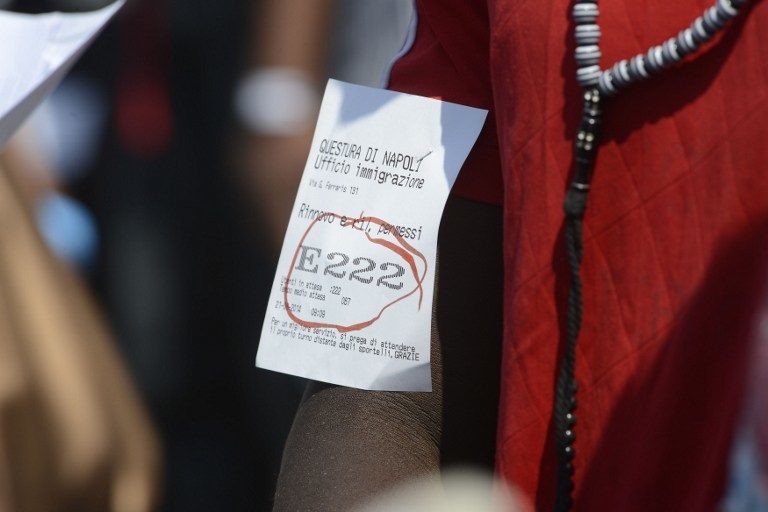SUMMARY
This is AI generated summarization, which may have errors. For context, always refer to the full article.

ROME, Italy – A baby born at sea on Christmas Day after his Nigerian mother was plucked from a floundering migrant boat by the Italian navy has been baptized Testimony Salvatore in honor of the medics who delivered him.
The two-day old infant, who weighed in at 2.7 kilograms (just under six pounds), and his 28-year-old mother were both recovering in hospital on Saturday after what was a smooth delivery in testing circumstances, according to the gynecologist who oversaw it.
The cheering Christmas tale came as it was confirmed that Italian authorities have identified a 32-year-old Egyptian man as a lynchpin in the large-scale people smuggling that has been instrumental in sending asylum seekers and economic migrants across the Mediterranean in unprecedented numbers this year.
Described as a trafficking “superboss” and named as Ahmed Mohamed Farrag Hanafi, the alleged trafficking overlord is now being pursued by the Egyptian authorities at Italy’s request, prosecutors in the Sicilian city of Catania confirmed.
The suspect is thought to be based in the Kafr el-Sheikh Governorate in northern Egypt and had been identified as a result of intercepted mobile calls to traffickers working for him on boats leaving Libya.
Really scared
Little Testimony entered the world at 20 minutes before midnight on December 25, aboard the Italian navy vessel Etna as it headed to the Sicilian port of Messina with hundreds of migrants on board following rescue operations off Libya.
He is the third baby to be delivered by the navy in just over three months: following Gambian girl Yambambi Yete in September and Eritrean boy Aloniab Nahom, who was also delivered on the Etna, earlier this month.’
“The lady was brilliant,” said Maita Sartori, the gynecologist who oversaw the latest birth. “She did everything herself, all we had to do was to be there and monitor the labor, talking to her in English.”
The mother, whose first name is Kate according to Italian media, was travelling with Testimony’s 15-month-old sister and was quoted as saying: “I’m really happy with the birth of my son. I was really scared but everything went well in the end.”
She told reporters the family had left Nigeria two months ago and that she and her youngest child had boarded a boat in Libya on December 23, having left her husband and two older sons, aged 6 and 10, in neighboring Algeria.
Death traps
Italian naval vessels picked up a total of 2,300 people from troubled boats over the Christmas period, lifting to more than 170,000 the number of migrants from north Africa registered as having landed on Italian soil this year.
More than 80 percent of them leave from Libya, where traffickers are able to operate with impunity because of the chaos engulfing a country that has disintegrated into warring fiefdoms.
The conflict in Syria and Iraq and repression in Eritrea have been the two biggest factors behind the migrant surge this year with Syrian and Eritrean nationals accounting for over half the arrivals in Italy.
Typically, refugees boarding boats in Libya have paid traffickers several thousand dollars each for what is sold as a ticket to Europe.
Increasingly however it appears that the people smugglers simply aim to get the boats into open water and rely on the human cargo being picked up by either the Italian navy or by passing merchant ships which are obliged, under the law of the sea, to respond to distress calls.
Responsibility for patrolling Europe’s southern shores in theory lies with Triton, a multinational operation run by the European borders agency Frontex. But in practice the Italian navy has continued to carry out most of the rescues despite officially scaling back its own Mare Nostrum operation at the end of October after failing to persuade other EU governments to help fund it.
Hopes the advent of winter would stem the flow of boat people have been dashed although there have been signs that the traffickers are switching to bigger cargo boats, having previously relied largely on converted fishing vessels or inflatable dinghies.
The cargo boats may be less vulnerable to inclement weather but are frequently in a poor condition, making them potential death traps, according to aid organizations. – Rappler.com
Add a comment
How does this make you feel?
There are no comments yet. Add your comment to start the conversation.